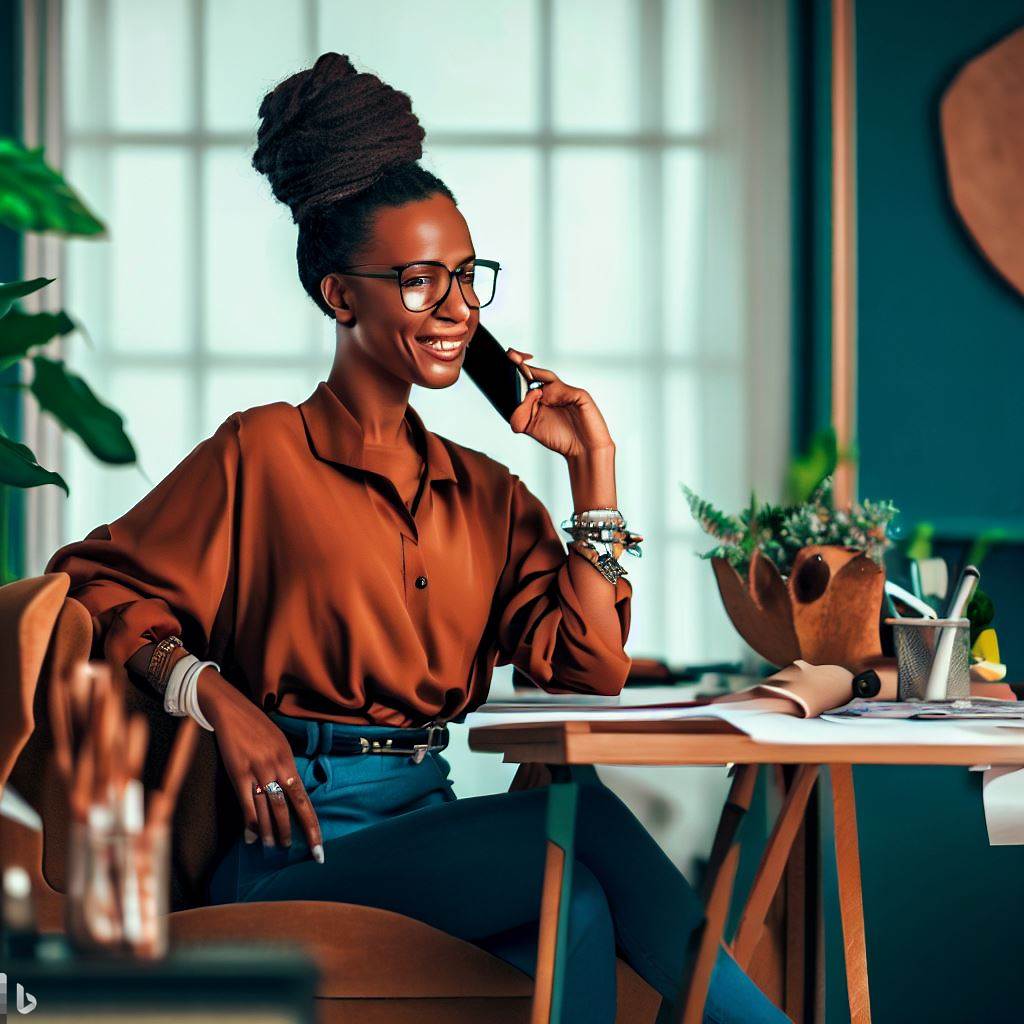Introduction
The demand for interior designers in Nigeria is on the rise, creating a thriving industry.
The purpose of this blog post is to provide a guide for clients in Nigeria looking to hire an interior designer.
The intended audience is individuals seeking professional assistance for their interior design projects.
This guide aims to equip clients in Nigeria with valuable tips and insights to successfully hire an interior designer who can bring their design visions to life.
Hook:
The surge in demand for interior designers in Nigeria underscores the quest for personalized, aesthetic spaces.
Purpose:
This blog post assists potential clients, offering insights into hiring interior designers effectively.
Intended Audience: Individuals, homeowners, and businesses seeking professional guidance to transform their spaces.
Thesis Statement: Unveiling a comprehensive guide to empower Nigerian clients in selecting and collaborating with adept interior designers.
Key Tips for Successful Hiring
- Define Your Vision: Clearly outline your preferences, style, and expectations for the project’s outcome.
- Research and Shortlist: Explore local designers’ portfolios, credentials, and past projects. Narrow down your options.
- Compatibility Check: Meet potential designers to assess rapport, communication, and shared understanding.
- Budget Alignment: Discuss costs upfront, ensuring transparency and preventing budget overruns.
- Creative Expertise: Evaluate designers’ creativity, problem-solving skills, and ability to harmonize aesthetics with functionality.
- Project Timeline: Set clear deadlines and discuss the designer’s availability to ensure timely completion.
- Communication Channels: Establish effective modes of communication and updates throughout the project.
- Contract and Agreements: Formalize the arrangement with a detailed contract covering scope, fees, and responsibilities.
- Collaborative Approach: Embrace open collaboration, valuing the designer’s input while expressing your preferences.
- Flexibility: Allow room for adjustments as designs evolve, fostering a fluid yet purposeful process.
Closing Remark:
By following these strategic steps, you’re not only hiring an interior designer but embarking on a transformative journey to redefine your spaces.
Understanding the Role of an Interior Designer
A professional interior designer plays a crucial role in transforming spaces and creating aesthetically pleasing and functional environments.
Understanding their role and the services they offer can help clients make informed decisions when hiring an interior designer.
Define the role of an interior designer and explain their significance in transforming spaces.
An interior designer is a trained professional who specializes in creating functional and visually appealing interiors for residential and commercial spaces.
They have a deep understanding of design principles, space planning, and color coordination.
These designers work closely with clients to understand their vision, preferences, and requirements.
They then use their expertise to conceptualize and execute designs that transform spaces into inviting and efficient areas.
The significance of an interior designer cannot be overlooked. Their role goes beyond simply selecting furniture and décor.
They have a keen eye for detail, ensuring that every element harmonizes with each other and the overall design concept.
Interior designers possess the knowledge and skills to optimize the use of space, maximizing functionality while enhancing the visual appeal.
They have a thorough understanding of materials, finishes, and textures, allowing them to create unique and personalized designs.
Discuss the broad range of services offered by interior designers
Interior designers offer an extensive range of services that cater to various design needs and preferences. These services include:
- Space Planning: Interior designers assess the available space and develop efficient layouts that optimize functionality and flow.
- Concept Development: They create design concepts based on client preferences, incorporating elements such as color schemes, furniture styles, and lighting.
- Material Selection: Interior designers offer guidance in selecting appropriate materials, finishes, and textures that align with the overall design concept.
- Furniture and Décor Selection: They assist in choosing furniture, fixtures, and accessories that complement the design concept and meet the client’s requirements.
- Lighting Design: Interior designers create lighting plans that enhance the ambiance and functionality of spaces, considering natural and artificial lighting options.
- Project Management: They oversee the entire design project, coordinating with contractors, suppliers, and tradespeople to ensure seamless execution.
- Budgeting and Cost Estimation: Interior designers provide cost estimates and help clients establish realistic budgets to achieve their desired design outcome.
Highlight the benefits of hiring a professional interior designer
Hiring a professional interior designer brings several benefits to clients:
- Expertise and Vision: Interior designers are trained professionals with a deep understanding of design principles and industry trends. They can bring fresh ideas and a unique perspective to the project.
- Time and Cost Efficiency: With their knowledge and experience, interior designers can effectively manage resources, avoiding costly mistakes and ensuring timely project completion.
- Create Functional Spaces: Interior designers optimize the use of space, enhancing its functionality and addressing specific needs while maintaining a visually appealing design.
In review, understanding the role of an interior designer and the services they offer is crucial when hiring one.
Their expertise, vision, and ability to transform spaces bring significant benefits, making them indispensable professionals in the design industry.
Read: The Impact of Fake News on Journalism in Nigeria
Researching and Gathering Information
Emphasize the importance of research in finding the right interior designer
Research plays a crucial role in ensuring you find the perfect interior designer for your project.
It allows you to gather information, compare options, and make an informed decision.
Identify different sources of information such as online platforms, referrals, and professional associations
- Online Platforms: Utilize websites, blogs, and social media platforms to explore the work and portfolios of various interior designers.
This provides a glimpse into their style, expertise, and previous projects. - Referrals: Seek recommendations from friends, family, or colleagues who have worked with interior designers before.
Their first-hand experiences can give you valuable insights and help you discover talented professionals. - Professional Associations: Check out professional associations like the Interior Designers Association of Nigeria (IDAN) for a list of registered and qualified interior designers.
Membership in such organizations showcases their dedication to their craft.
Provide tips on how to evaluate and shortlist potential interior designers
- Portfolio Assessment: Assess the portfolios of shortlisted interior designers to determine if their previous work aligns with your aesthetic preferences.
Look for creativity, versatility, and attention to detail. - Client Reviews and Testimonials: Research feedback from previous clients to learn about their experiences with the interior designer.
Positive reviews indicate professionalism and customer satisfaction. - Meeting and Interview: Arrange meetings or interviews with shortlisted designers to discuss your project.
This gives you the opportunity to gauge their communication skills, level of enthusiasm, and understanding of your requirements. - Budget Considerations: Inquire about pricing, payment terms, and any additional charges.
Ensure the designer’s fees are within your budget and that they are transparent about cost estimates. - Experience and Expertise: Evaluate the designer’s experience in handling projects similar to yours.
Consider the scope of their expertise, including knowledge of materials, space planning, and current design trends. - Compatibility: Assess how well you connect with the interior designer.
A good working relationship is essential for a successful project, so choose someone who listens, understands your vision, and respects your input. - Professional Credentials: Verify the designer’s qualifications, certifications, and licenses.
This ensures they have the necessary skills and knowledge to execute your project professionally and safely.
By conducting thorough research and gathering sufficient information, you increase your chances of hiring the right interior designer who can bring your vision to life.
Take your time, compare options, and trust your instincts while making this important decision.
Remember, a well-researched choice leads to a satisfying partnership and a beautifully designed space.
Read: Collaboration in Design: Working with Architects in Nigeria
Assessing Portfolio and Style Compatibility
Importance of Examining an Interior Designer’s Portfolio
Examining an interior designer’s portfolio is crucial as it gives clients a glimpse into their past work.
It helps clients assess the designer’s skill level, expertise, and the quality of their previous projects.
By looking at the portfolio, clients can determine if the designer’s style matches their own preferences and requirements.
Additionally, a portfolio serves as proof of the designer’s capabilities and the range of design styles they can handle.
Factors to Consider When Evaluating Style, Expertise, and Previous Projects
- Style: Look for a designer whose style aligns with your taste and desired aesthetic.
- Expertise: Evaluate the designer’s expertise in specific areas such as residential or commercial design.
- Previous Projects: Explore their previous projects to get an idea of their creativity and versatility.
- Quality: Assess the overall quality of their work, including the choice of materials and attention to detail.
- Consistency: Check if the designer’s style and quality are consistent throughout their portfolio.
Ways to Determine if the Designer’s Style Aligns with the Client’s Vision
- Communication: Have open and honest discussions about the client’s vision and expectations.
- Visual References: Provide the interior designer with images or examples of what you desire.
- Mood Boards: Collaborate on mood boards to ensure everyone is on the same page regarding style.
- Site Visits: Visit some of the designer’s completed projects to see if their style resonates with you.
- Client Testimonials: Read testimonials to understand how previous clients felt about the designer’s work.
Ultimately, it is important to choose an interior designer whose portfolio showcases their expertise and aligns with the client’s vision.
Examine the portfolio closely, considering the style, expertise, previous projects, and how it aligns with your own preferences.
By doing so, you can increase the chances of finding the perfect interior designer who can transform your space into a dream come true.
Read: Legal Considerations for Nigerian Sound Editors

Considering Budget and Cost Estimates
Address the significance of discussing budget constraints openly with the interior designer
Openly discussing budget constraints with your interior designer is crucial for a successful collaboration.
It allows both parties to align expectations and ensures that the design plan is tailored to your financial capabilities.
By openly sharing your budget, the interior designer can focus on creating a design that meets your needs while staying within the allocated funds.
This transparency will prevent unnecessary revisions, delays, or disappointment during the project.
Provide guidance on understanding cost estimates, including fees and expenses involved in the design process
Understanding the cost estimates provided by the interior designer is essential to make informed decisions about your project.
Cost estimates typically include three main components:
- Design Fees: These fees cover the interior designer’s time, expertise, and creativity invested in your project.
They can be charged as a fixed rate, hourly rate, or a percentage of the project’s total cost. - Project Expenses: These expenses encompass various items required for the design, such as purchasing furniture, materials, or hiring subcontractors.
Make sure to discuss who will be responsible for sourcing and purchasing these items. - Contingency Fund: It’s advisable to set aside a contingency fund to accommodate unexpected expenses that may arise during the project, such as unforeseen repairs or design changes.
Request a detailed breakdown of the cost estimates from the interior designer to gain clarity on each expense category.
Discuss negotiation techniques for reaching a fair agreement with the chosen designer.
Negotiating a fair agreement with your chosen interior designer is essential to ensure both parties are satisfied.
Here are some techniques to consider:
- Research and Compare: Research different interior designers and their pricing structures to have an idea of the industry standards. Compare multiple quotes before making a decision.
- Be Realistic: Understand that quality design and expertise come with a price. Be open to investing in the right professional who can deliver the results you desire.
- Communicate Clearly: Clearly communicate your expectations, budget constraints, and desired outcomes. An open and honest conversation can lead to finding common ground.
- Consider Trade-Offs: If the initial cost estimate exceeds your budget, discuss potential trade-offs with the designer. They can suggest alternative materials or adjustments without compromising the overall vision.
- Ask for Alternatives: Inquire about potential cost-saving measures without compromising the quality and aesthetic of the design. Experienced designers often have creative solutions to optimize the budget.
- Review the Contract: Carefully review the contract and ensure it includes all the mutual agreements regarding costs, payment schedules, and any additional provisions or contingencies.
Remember, negotiation should aim for a fair agreement that takes both parties’ needs into account.
Building a solid working relationship with your designer by finding a mutual understanding will contribute to a successful project outcome.
Read: Digital Journalism Trends Shaping Nigeria’s Media
Conducting Interviews and Assessing Skills
Tips for preparing for and conducting effective interviews with shortlisted designers
- Research each designer beforehand to understand their previous work and experience.
- Create a list of specific questions related to your project and the designer’s expertise.
- Prepare a comfortable and welcoming space for the interview to foster open communication.
- Make a timeline of your project and discuss it with the designer to assess their availability.
- Request samples or a portfolio of the designer’s previous work to review during the interview.
Essential questions to ask during the interview to assess the designer’s skills, experience, and communication ability
- How many years of experience do you have in interior design?
- Can you provide references from previous clients or show testimonials from satisfied clients?
- What is your design style and how do you adapt it to different client preferences?
- How do you handle conflicts or disagreements with clients during a project?
- How do you stay updated with the latest design trends and technologies?
Importance of evaluating the designer’s problem-solving ability and adaptability
Interior design projects often present unexpected challenges and changes.
Assessing the designer’s problem-solving ability allows you to determine their expertise in finding creative solutions.
Their adaptability is crucial to ensure they can adjust their design plans based on client feedback and evolving project requirements.
Look for designers who can think outside the box and have a track record of successfully overcoming obstacles in their previous projects.
Checking References and Reviews
When it comes to hiring an interior designer in Nigeria, checking references and reviews from previous clients is of utmost importance.
It gives you an insight into the designer’s capabilities, professionalism, and work ethics.
Significance of Checking References and Testimonials
Checking references and testimonials allows you to gauge the satisfaction level of previous clients who have worked with the interior designer.
It gives you an idea of the quality of their work and their ability to meet client expectations.
By contacting these references, you can gather firsthand information about the designer’s communication skills, reliability, and adherence to deadlines.
It helps you assess whether the designer is a good fit for your project and whether they can deliver the desired results within your timeframe.
Testimonials also lend credibility to the designer’s claims.
They provide social proof that the designer has successfully completed projects and left clients satisfied with their services.
Seeking Out and Evaluating Online Reviews and Ratings
In today’s digital age, online reviews and ratings play a significant role in decision-making.
When seeking out an interior designer, it is essential to utilize online platforms to gather reviews and evaluate the designer’s reputation.
Start by searching for the designer’s name on search engines, social media platforms, and professional networking sites.
Look for reviews and comments left by previous clients. These online reviews provide insights into the designer’s ability to meet client expectations and the overall satisfaction level of their work.
It is crucial to evaluate these online reviews objectively.
Consider the overall sentiment, the number of positive reviews versus negative reviews, and the specific feedback mentioned by clients.
Look for recurring themes or concerns that may impact your decision to hire the designer.
Moreover, consider online ratings provided by reputable sources such as industry-specific websites or directories.
These ratings can help you compare different designers and narrow down your options based on their overall performance.
Importance of Contacting References Directly
While online reviews and testimonials provide valuable information, contacting references directly can offer a more comprehensive understanding of a designer’s work ethics and professionalism.
When talking to references, inquire about their experience working with the designer.
Ask about their satisfaction level, communication with the designer, adherence to timelines, and the final outcome.
Understand the challenges they faced during the project and how the designer handled them.
By speaking directly with references, you can address any specific concerns or queries you may have.
It allows you to ask detailed questions and gain insights into the designer’s approach, problem-solving skills, and ability to handle unique project requirements.
Remember to be respectful of the references’ time and keep the conversation focused on gathering information that is relevant to your decision-making process.
Checking references and reviews is an essential step in hiring an interior designer in Nigeria.
It provides valuable insights into the designer’s capabilities, professionalism, and work ethics.
By utilizing online reviews and testimonials, as well as contacting references directly, you can make informed decisions and find the right designer for your project.
Finalizing the Contract and Collaboration
Key Elements to Include in a Contract with an Interior Designer
- Scope of Work: Clearly define the specific tasks and services the interior designer will provide.
- Timeline: Set a realistic timeline for the completion of each phase and the entire project.
- Payment Terms: Outline the payment schedule, including any deposits, milestones, or final payment.
- Budget: Specify the agreed-upon budget for the project, including allowances and limitations.
- Intellectual Property: Clarify who owns the rights to the design plans, drawings, and other intellectual property.
- Changes and Amendments: Establish how changes to the scope, timeline, or budget will be handled.
- Termination Clause: Define the conditions under which either party can terminate the contract.
- Confidentiality: Address the protection of sensitive client information and the designer’s confidentiality obligations.
- Liability and Insurance: Determine the responsibilities for damages, insurance coverage, and professional liability.
- Dispute Resolution: Identify the preferred method of resolving any conflicts or disputes that may arise.
Importance of Clear Communication and Establishing Expectations
Clear communication is vital to ensure a successful collaboration between clients and interior designers.
By effectively conveying their desires, preferences, and requirements, clients can help the designer understand their vision accurately.
It is crucial to establish expectations early on and maintain ongoing communication throughout the project to prevent misunderstandings or deviations from the original plan.
Publish Your Professional Profile, Business or Brand
Showcase your expertise, gain trust, and boost visibility instantly on Professions.ng.
Publish NowOpenly discussing expectations allows both parties to align their goals and ensure everyone is on the same page.
This includes clarifying the desired style, functionality, budget, and timeline. Regular meetings and progress updates foster transparency and enable adjustments if needed.
Tips for Maintaining a Positive and Productive Working Relationship
- Trust and Respect: Trust in the expertise and creativity of the interior designer in order to foster a respectful relationship.
- Active Participation: Collaborate with the designer by actively engaging in discussions and providing timely feedback.
- Flexibility: Be open to new ideas and suggestions that the interior designer may present during the design process.
- Timely Payments: Adhere to the agreed-upon payment schedule to maintain a smooth working relationship.
- Clear and Constructive Feedback: Provide specific feedback and critiques to help the designer meet your expectations effectively.
- Problem Resolution: Address any issues promptly and openly, allowing for resolutions to be found proactively.
- Avoid Micromanagement: Give the designer creative freedom and avoid excessive interference in their decision-making process.
- Regular Communication: Stay in touch with the designer regularly to ensure continuous progress and address any concerns promptly.
- Appreciation and Recognition: Recognize and appreciate the designer’s hard work, creativity, and talent throughout the project.
- Post-Project Evaluation: Conduct a thorough evaluation after the project’s completion to provide feedback and potentially collaborate again in the future.
By following these tips, clients can maintain a positive and productive working relationship with their interior designer, resulting in a successful and satisfying outcome for both parties.
Finalizing the contract and collaborating with an interior designer requires attention to crucial elements such as the scope of work, timeline, payment terms, and intellectual property.
Clear communication and establishing expectations play a significant role in ensuring a successful partnership.
Additionally, maintaining a positive and productive working relationship throughout the design process involves trust, active participation, and open communication.
By following these guidelines, clients can facilitate a smooth and fruitful collaboration with their interior designer in Nigeria.
Conclusion
In this blog post, we discussed the key points to consider before hiring an interior designer in Nigeria.
It is crucial to emphasize the importance of hiring a professional interior designer to ensure excellent results.
We encourage clients in Nigeria to utilize the provided tips in order to have a successful and satisfying collaboration with their chosen designer.
Recap:
Define vision, research, assess compatibility, align budgets, value creativity, and establish clear communication.
Importance:
Professional interior designers bring expertise, creativity, and finesse, elevating your space beyond expectations.
Encourage:
Embrace the outlined steps to cultivate a collaborative journey, achieving a harmonious and remarkable design partnership.




